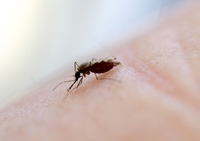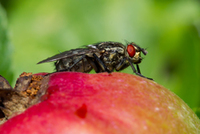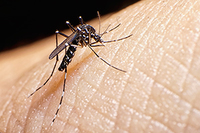Using mathematical models to fight the Zika virus

New research from the University of Notre Dame will be used to generate maps that provide time-sensitive, mosquito-to-human ratios that determine patterns of mosquito population dynamics for the Zika virus. The model outputs will be available online to provide users with the ability to find reported cases and estimated incidences by location of the virus to improve disease transmission and prevalence forecasts, which is critical to making accurate predictions and translating results into effective public health strategies.
Scientists detect wasps evolving into new species

Scientists have observed three species of wasps evolving into three new species, an intriguing case of rapid evolution in action. Understanding how new species form, a process termed “speciation,” is a central question in biology. Scientists typically study speciation with respect to how populations of a single species diverge to form two distinct species.
ND-LEEF pavilion receives award from Indiana AIA

The Morrison Family Education and Outreach Pavilion received a 2015 Citation Award from the American Institute of Architects (AIA) Indiana. Constructed in October 2014, the pavilion marks the inaugural building at Notre Dame’s Linked Experimental Ecosystem Facility (ND-LEEF), and the first University structure to receive a commendation from AIA Indiana Design Awards. The Morrison Pavilion was recognized in AIA’s new construction category for projects costing less than $1 million. The four-member AIA Jury commented on the pavilion: “We were impressed with every detail and choice made in the design of this structure. The decision to orient the building along the summer solstice, and to situate it with its back to the approach, a simple swath of mown meadow, was poetic.”
Environment of tumors impacts metastasis, study finds

If a tumor is like a seed, the soil around it plays a significant role in its growth, a new study finds. According to the study’s results, the microenvironment of a tumor cell has significant impact on cancer metastasis. This discovery by Siyuan Zhang at Notre Dame and a team at the University of Texas MD Anderson Cancer Center has focused attention on fighting cancer in the tumor cell’s microenvironment.
Mosquitos capable of carrying Zika virus found in Washington, D.C.

On Monday (Jan. 25), the World Health Organization announced that Zika virus, a mosquito-borne illness that in the past year has swept quickly throughout equatorial countries, is expected to spread across the Americas and into the United States.
Breast cancer researcher studies antioxidant connection

When it comes to fighting cancer, the enemy of our enemy could be our friend, according to a University of Notre Dame researcher. As studies continue to suggest antioxidants could actually help cancer cells grow, the research of Zachary Schafer, the Coleman Foundation Associate Professor of Cancer Biology, can help explain why.
Senior Mark Brahier explores barriers to healthcare in Nicaragua

Mark Brahier, a senior biological sciences major and international development studies minor, spent five weeks in Nicaragua this summer. Traveling with International Samaritan on his fourth trip to Central America, Brahier set out to study social, political, economic, and geographic barriers to healthcare access. “As a student studying biology and international development, this research project was a great way to show how all of my interests intersect, since it is very interdisciplinary,” Brahier said. “When I arrived in Nicaragua, I quickly realized there were more important areas of research to explore and changed the focus of my project.”
Success for Notre Dame researchers at annual Indiana CTSI Conference

On Friday, September 11, 2015, the 7th Annual Indiana Clinical and Translational Sciences Institute (CTSI) Meeting and Watanabe Prize Lecture took place in Indianapolis. This year’s theme was “Immune and Cell-based Therapies.” The day-long, annual conference highlights advances in the clinical and translational sciences from the three partner universities, which include Indiana University, Purdue University, and the University of Notre Dame.
Fighting for clean water
At the Environmental Change Initiative, Professor Jennifer Tank is conducting research to help farmers across the country make positive changes to solve this widespread challenge. As the Galla Professor of Biological Sciences, she is studying the benefits of farming techniques designed to keep nutrients like nitrogen and phosphorus on fields, where farmers need them. Her research combines the wide-scale planting of cover crops in winter with innovative drainage strategies that can reduce fertilizer runoff to streams and rivers. By working closely with farmers using these two techniques, Tank’s findings have shown that protecting freshwater does not need to come at a cost to agricultural production.
WHO's LF elimination program is not enough

More than 1 billion people in tropical and subtropical countries are at risk for lymphatic filariasis (LF), also known as elephantiasis. The World Health Organization has set a goal to eliminate LF in vulnerable countries through mass drug administrations, an effort that has seen dramatic results. However, a new study suggests that WHO’s recommendations for elimination are not enough.
Introducing Mary Galvin, dean of the College of Science

Watch video Mary Galvin, the William K. Warren Foundation Dean of the College of Science, sat down for a brief question-and-answer session about her experience, her passion for scientific research and her new role at the University of Notre Dame. When asked what drew her to Notre Dame, Galvin is quick to answer: alignment with the University’s mission, and the chance to work with students again.
Nicole Achee to serve on NAS committee examining the responsible use of gene technology

Nicole Achee, research associate professor in the Department of Biological Sciences, has been appointed by the National Academy of Sciences (NAS) to participate in an ad hoc committee for the project, “Gene Drive Research in Non-Human Organisms: Recommendations for Responsible Conduct.”
Gary Lamberti to direct GLOBES Program

The Reilly Center is delighted to announce that Gary Lamberti, professor of biological sciences and director of the Stream and Wetland Ecology Laboratory at the University of Notre Dame, has agreed to serve as the interim director of the GLOBES Program in Environment and Society for 2015-16 academic year.
Biologist sees common ground in Pope Francis’s environmental stance

In a column published in the July 30 edition of Nature magazine, David M. Lodge, the Ludmilla F., Stephen J., and Robert T. Galla Professor of Biological Sciences, said that Pope Francis has opened common ground for science and religion, especially on environmental issues. Lodge, a Protestant who has worked for 30 years at Notre Dame, is an expert on freshwater ecology, invasive species, and environmental policy. He wrote that the Pope could “help to bridge the divide between science and the Protestant views that dominate the religious ‘anti-science’ movement.”
Jessica Hellmann named Director of University of Minnesota’s Institute on the Environment

Jessica Hellmann, associate professor and associate department chair of Biological Sciences at the University of Notre Dame, has been named the new director of the University of Minnesota’s Institute on the Environment. As director, Hellmann will work to solve grand environmental challenges, while advancing interdisciplinary research, teaching and engaging with external partners and stakeholders. Her appointment, effective August 31, includes joining the University as a Russell M. and Elizabeth M. Bennett Professor in the Department of Ecology, Evolution and Behavior.
Researchers discover massive genome switch in one generation

A team of biologists from the University of Notre Dame, Rice University and three other schools has discovered that an agricultural pest that began plaguing U.S. apple growers in the 1850s likely did so after undergoing extensive and genome-wide changes in a single generation.
Mary Galvin appointed dean of College of Science

An accomplished scientist with extensive experience in the academic, government and private sectors, Mary E. Galvin has been appointed the William K. Warren Foundation Dean of the College of Science at the University of Notre Dame by Rev. John I. Jenkins, C.S.C., the University’s president.
Notre Dame faculty read and react to new encyclical on climate change

University of Notre Dame faculty members continue to comment on the new encyclical Laudato Si’, issued by Pope Francis in Rome on Thursday (June 18). In an op-ed essay in Wednesday’s edition of the Chicago Tribune, Notre Dame President Rev. John I. Jenkins, C.S.C., writes that, “It is characteristic of this pope to speak as the Catholic leader but to seek to build bridges to all people who promote friendship and cooperation serving the good of all.
The pursuit of "why?"

The pursuit of the question, “Why?” has taken Siyuan Zhang from his native China to Notre Dame to find answers in the battle against breast cancer. “I tell my students the best of the best have curious minds,” says Zhang, the Nancy Dee Assistant Professor of Cancer Research at Notre Dame’s Mike and Josie Harper Cancer Research Institute. “The best of the best are always asking, ‘why?’
Notre Dame researcher part of team showing that 'humanized' mice can be used to study malaria

University of Notre Dame researcher Mike Ferdig is part of team of researchers who have demonstrated that so-called “humanized” mice can be an effective model to study parasites that cause malaria and resistance to malarial drugs. Their study appears in the June 1 edition of the journal Nature Methods.